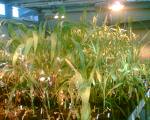The Impacts of Biotechnology on Agriculture and the Food Chain: Evidence of Worldwide GMO Contamination

“UK’s push for GM crops looks ill considered and irresponsible”. Megan Noble and Lawrence Woodward
Does Owen Paterson – described as the biotech companies’ latest PR man – know about the recent experience of GM contamination in Oregon, Switzerland, Western Australia and other regions? The fear is that GMOs cannot be contained in the field, the food chain or even in research trials.
- South Korea doesn’t grow genetically engineered crops but imports animal feed. It is finding GM plants growing wild in areas around major ports, factories, livestock farms and roads. The most commonly found GM species were maize (corn), cotton and rapeseed. The National Institute for Environmental Research reported that there has been a 33% increase in the level of detected GMO contamination cases in the wider environment since 2009.
 GM canola (oilseed rape) is being spilled as it passes through the Rhine port of Basel and along Switzerland’s railway system. Bernard Nicod, a member of the executive committee of the Swiss Farmers’ Association said, “It would be hard to separate the cycle of production and distribution of conventional agriculture from that of transgenic agriculture. We are not sure we can cope with the extra costs of that kind of separation.”
GM canola (oilseed rape) is being spilled as it passes through the Rhine port of Basel and along Switzerland’s railway system. Bernard Nicod, a member of the executive committee of the Swiss Farmers’ Association said, “It would be hard to separate the cycle of production and distribution of conventional agriculture from that of transgenic agriculture. We are not sure we can cope with the extra costs of that kind of separation.”
- Genetically modified (GM) wheat growing in Oregon led to Japan and South Korea banning imports of US white winter wheat. The discovery was made by the University of Oregon and forwarded on to the US Department of Agriculture (USDA). Neither Monsanto or the USDA has explained how the contamination occurred. See the Guardian this week.
- Currently beset by fracking-related problems, earlier this month a local paper reported tests on genetically modified wheat in North Dakota. These are being conducted by Monsanto – following the discovery of contamination in neighbouring Oregon – under a ‘cloak of secrecy’, a local farmer said Monsanto, which owns a wheat development company based in the nearby city of Bozeman, didn’t respond to a request for comment last week. In 2010, Nature reported GM canola growing wild in the region.
- Legal proceedings are still under way after an organic farm in Kojonup Western Australia was contaminated, in 2010, with genetically modified canola contamination. The WA government revoked Steven Marsh’s organic certification.
Lesley Docksey, in Global Research, writes:
“This constant dishonest pressure on the public from people like Paterson to accept something they do not want must stop. It is dishonest because their ‘facts’ are at the least unproven, and at worst, untrue. Nor do they really care about feeding the world. If they did they’d stop the waste of so much food and ensure people had equal access to what the earth can provide. This is all about giving the biotech companies control over the world’s food”.
Noble & Woodward conclude:
“Until a solution to prevent contamination is found the answer is to stop transporting these genetically engineered crops across the world; stop feeding them to animals; and even to stop growing them”.
Copyright political-cleanup.org 2013

